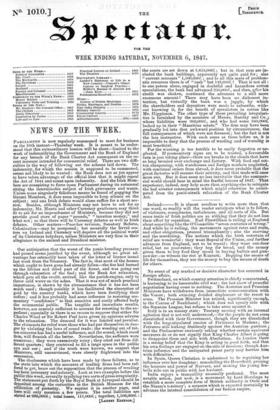Our anticipation that the worst of the panic-breeding pressure had
passed seems justified by the event, although no great ad- vantage has ostensibly been taken of the letter of licence issued last week from the Treasury. The fact is that most of the houses which ought to have gone had already fallen—the fire had burned up the lifeless and dried part of the forest, and was going out through exhaustion of the fuel ; and the Bank Act relaxation, which gets all the credit, arrived, like the parish-engine, only to throw cold water on the ashes. That it was not of much practical importance, is shown by the circumstance that it has not been much used ; though possibly it has facilitated the absorption of gold by the country banks' which have been fortifying their coffers ; and it has probably had some influence in restoring mo- mentary "confidence" to that sensitive and easily affected body the commercial public. The tangible and immediate results, however, are scarcely sufficient to account for resorting to the ex- pedient; especially as there is no reason to suppose that either Sir Charles Wood or Sir Robert Peel have given up opinions adverse to the relaxation. The demand for it was limited and peculiar. The claimants for relief were those who had put themselves in dan- ger by violating the laws of sound trade; the weeding out of rot- ten concerns has had a useful influence, and the sound, which stood firm, will flourish all the better. Nevertheless, the sufferers were numerous they were excessively noisy ; they cried out from dif- ferent quarters; they contrived to fill a large space in the public eye and ear ; and if the truth were known, we suspect that Ministers, still unconvinced, were sheerly frightened into the concession.
The disclosures which have been made by these failures, as to the state into which the accounts of leading firms had been suf- fered to get, bears out the supposition that the process of weeding has been necessary and salutary. Look at two examples before the public this week, severally typifying two sorts of gross irregularity. The statement put forth by the Royal Bank at Liverpool should be deposited among the curiosities in the British Museum for the edification of posterity. We reprint it in another page, and here will only mention a few points. The total liabilities are stated at 995,0001.; total losses, 111,0001.; together, 1,106,0001.: the assets are set down at 1,855,0001.; but in that sum are in- cluded the bank buildings apparently not quite paid for •' also
"current accounts" 1,500,000/. ; and to all this mass of problem- atic resources there is of "cash" but 143,600/. I That is not all : to one person alone, engaged in doubtful and hazardous cotton speculations, the bank had advanced 250,0001., and then, after his credit was shaken, continued the advances to a still more enormous amount ! There may have been no dishonest in- tention, but virtually- the bank was a juggle, by which the shareholders and depositors were made to subscribe, with- out knowing it, for the benefit of speculators in cotton like Mr. Higginson. The other type of these prevailing irregulari- ties is furnished by the accounts of Messrs. Barclay and Co.,- whose liabilities were 389,000/., and who had some 340,0001. locked up in their "Mauritius estate." The firm may have been gradually led into that awkward position by circumstances, the full consequences of which were not foreseen ; but the fact is not the less instructive. With such cases as these before us, it is impossible to deny that the process of weeding and of warning is most beneficial.
For the warning is too terrible to be easily forgotten or ne- glected. If premonitory signs are to be trusted, a favourable turn is just taking place—there are breaks in the clouds that have so long brooded over exchange and factory. With food and cot- ton cheapening, with warehouses and foreign markets unglutted, with continual orders from abroad, it does seem probable that the _great factories will resume their activity, mid that trade will once
• more stir. But it does seem no less inevitable that the commer- cial world should bear in mind the fearful lessons of 1847. That experience, indeed, may help more than anything else to mitigate the bad ulterior consequences which might otherwise be antici- pated from the panic-struek relaxation of the Bank Charter • Act.


























